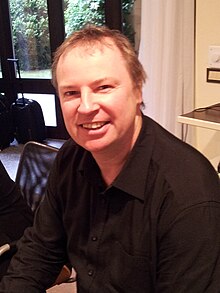Peer Bork
Peer Bork | |
|---|---|
 | |
| Born | May 4, 1963 |
| Nationality | German |
| Alma mater | Leipzig University |
| Scientific career | |
| Fields | Computational biology |
| Institutions | European Molecular Biology Laboratory |
| Website | embl.de |
Peer Bork (born 4 May 1963[1]) is a German bioinformatician.[2] He is Director of the European Molecular Biology Laboratory (EMBL) site in Heidelberg, in south-west Germany.[3]
Bork received his PhD in biochemistry in 1990 from the Leipzig University and his habilitation in theoretical biophysics in 1995 from the Humboldt University of Berlin. He was appointed a Group Leader at EMBL in 1995.[4] He has worked on the microbiomes of humans and other animals.[2]
He is on the board of editorial reviewers of Science,[5] and is a senior editor of the journal Molecular Systems Biology.[6]
In 2000, Bork was elected as a Member of the European Molecular Biology Organization,[7] and in 2008 he received the Nature "mid-career achievement" award for science mentoring in Germany.[8] He was appointed a member of the German National Academy of Sciences Leopoldina in 2014.[4] He received an honorary doctorate from the University of Würzburg[4] in 2014 and Utrecht University in 2017.[9]
In 2021, Bork was awarded the Novozymes Prize "for developing groundbreaking, publicly available and integrative bioinformatic tools" by the Novo Nordisk Foundation[10]. He was also awarded the 2021 International Society for Computational Biology 'Accomplishments by a Senior Scientist Award' for "tremendous contributions to bioinformatics on a plethora of fronts within the field".[11]
References
[edit]- ^ "Katalog der Deutschen Nationalbibliothek". portal.dnb.de. Retrieved 6 December 2020.
- ^ a b Abbott, Alison (8 January 2016). "Scientists bust myth that our bodies have more bacteria than human cells". Nature. Springer Science and Business Media LLC. doi:10.1038/nature.2016.19136. ISSN 0028-0836. S2CID 190879263.
- ^ [1] Accessed May 2021.
- ^ a b c [2]. Leopoldina. Accessed May 2021.
- ^ Editors and Editorial Boards. American Association for the Advancement of Science. Accessed December 2017.
- ^ Editors & Board. EMBO. Accessed December 2017.
- ^ [3]. EMBO. Accessed May 2020.
- ^ Nature Awards for Mentoring in Science – Germany (2008). Springer Nature. Archived 15 July 2017.
- ^ Honory [sic] Doctorate for bioinformatician Peer Bork. Utrecht Bioinformatics Center. Accessed December 2017.
- ^ [4]. Novo Nordisk. Accessed May 2021.
- ^ [5]. ISCB. Accessed May 2021.
| International | |
|---|---|
| National | |
| Academics | |
| Other | |
Text is available under the CC BY-SA 4.0 license; additional terms may apply.
Images, videos and audio are available under their respective licenses.
